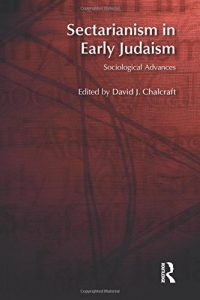CHALCRAFT, D. J. (ed.) Sectarianism in Early Judaism: Sociological Advances. Abingdon: Routledge, 2014, 256 p. – ISBN 9781845530839.
 Este livro apresenta oito estudos – inovadores, segundo a editora – que exploram o fenômeno das seitas no judaísmo antigo e a história das teorias sociológicas sobre movimentos sectários.
Este livro apresenta oito estudos – inovadores, segundo a editora – que exploram o fenômeno das seitas no judaísmo antigo e a história das teorias sociológicas sobre movimentos sectários.
Os colaboradores abordam fontes clássicas e contemporâneas da sociologia da religião, como os trabalhos de Max Weber, Ernest Troeltsch, Bryan Wilson, Stark e Bainbridge, Mary Douglas. Leia mais sobre a sociologia (weberiana) das seitas aqui.
Entre os autores estão, além de David J. Chalcraft, Lester L. Grabbe e Philip R. Davies, de quem já li alguns livros, também Peirluigi Pironavelli, Eyal Regev, Cecilia Wassen, Jutta Jokiranta, Albert I. Baumgarten…
Diz a editora:
This book presents eight new and path-breaking studies which explore the phenomenon of sects in ancient Judaism and the history of sociological theorizing of sectarian movements. Contributors draw on a full range of classical and contemporary sources in the sociology religion including the work of Max Weber, Ernest Troeltsch, Bryan Wilson, Stark and Bainbridge, Mary Douglas. The book represents a self-conscious foregrounding of sociological issues which the authors apply to their deep knowledge of the history and texts of the so-called sectarian communities. Critical consideration is given to the contexts in which Jewish sectarianism is to be understood, layers of redaction in the texts, the trajectories of sectarian groups, the location of sectarianism within a long term history of Judaism as well as in the context of the Second Temple; the relations between sects and the wider society, between themselves and between other religious and political movements are considered. Critical approaches are adopted to the reception and application of Weber’s ideas and for the first time a comprehensive survey of the contributions of Weber and Bryan Wilson, rooted in the development of their own work across time, is provided. The limits as well as the potentialities of their typologies and sociological theories are considered. Overall the book breaks out of a non reflective and non informed use of sociological typologies to ground conceptualization of sects and their histories in a purposeful sociological context, making controlled use of sociological theory, concepts and substantive findings of other sectarian movements. The book does not argue for any one sociological method or typology but only leads by example by showing the need to be cautious with the use of comparative material, and to ground theorizing in the very texts of the sociological theorist studied just as careful attention needs to be paid to the textual, historical and material evidence that remains.

ola bom dia.
Esta excelente!!!
Abçs.
Bispo Portinari.